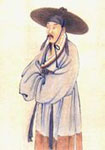“久向林间得佳趣”的意思及全诗出处和翻译赏析
“久向林间得佳趣”全诗
久向林间得佳趣,不知身外有浮名。
蒲萄雨足初全紫,乌臼霜前已半赬。
欲把一杯终觉嬾,老来怀抱为谁倾?
分类:
作者简介(陆游)

陆游(1125—1210),字务观,号放翁。汉族,越州山阴(今浙江绍兴)人,南宋著名诗人。少时受家庭爱国思想熏陶,高宗时应礼部试,为秦桧所黜。孝宗时赐进士出身。中年入蜀,投身军旅生活,官至宝章阁待制。晚年退居家乡。创作诗歌今存九千多首,内容极为丰富。著有《剑南诗稿》、《渭南文集》、《南唐书》、《老学庵笔记》等。
《秋兴》陆游 翻译、赏析和诗意
《秋兴》是宋代文学家陆游创作的一首诗词。下面是这首诗词的中文译文、诗意和赏析:
中文译文:
秋风又满会稽城,
有客飘然万事轻。
久向林间得佳趣,
不知身外有浮名。
蒲萄雨足初全紫,
乌臼霜前已半赬。
欲把一杯终觉嬾,
老来怀抱为谁倾?
诗意:
这首诗描绘了一个秋天的景象,以及诗人对人生和名利的思考。诗人观察到秋风再次吹满了会稽城,他自称有客,轻松自在,将一切世俗的事物都看得很淡。他长期在林间寻找乐趣,却不知道自己的身外还有一些名利之事。诗中提到蒲萄已经被秋雨浸润得酱紫,乌臼(一种植物)在霜前已经半霜红。最后,诗人表达了自己欲举杯庆祝却感到疲倦,他怀疑自己的努力和追求是否值得,不知道为了谁而奋斗。
赏析:
《秋兴》是陆游晚年创作的一首诗词,通过对秋天景象的描写,表达了他对名利和人生意义的思考。诗人借助秋风、蒲萄和乌臼等意象,将自然景物与人生经历相联系,揭示了他的内心感受和疑虑。
诗中的“有客飘然万事轻”表达了诗人已经超脱尘世的心态,他对于名利和俗务已经看得很淡,将一切事物都置于心外。诗人长期在林间寻找乐趣,体验大自然的美妙,但他也意识到自己可能忽略了一些世俗的名利之事,由此引发了对自己努力和价值的怀疑。
蒲萄和乌臼是秋天的象征,诗中的描绘表现了秋天的美景,同时也暗喻着岁月的流转和诗人自身的老去。蒲萄被秋雨浸润得紫红,乌臼在霜前已经半霜红,这些形象传递出秋天成熟和衰老的寓意。
最后两句“欲把一杯终觉嬾,老来怀抱为谁倾?”表达了诗人对于自己努力的疲倦和对未来的迷惘。诗人曾经追求名利,但现在感到一种疲倦,他开始怀疑自己所追求的目标是否真正值得,也不知道自己的努力和奋斗最终为了谁而付出。
整首诗词以秋天的景象为背景,通过对自然景物的描绘,表达了诗人对名利和人生的思考和疑问,展现了一种淡泊宁静的心态和对于时光流转的感慨。诗中的意象丰富,语言简练,给人以深思和共鸣《秋兴》 is a poem written by the Song dynasty literary figure, Lu You. Here is the Chinese translation, poetic meaning, and appreciation of the poem:
Chinese Translation:
秋风又满会稽城,
有客飘然万事轻。
久向林间得佳趣,
不知身外有浮名。
蒲萄雨足初全紫,
乌臼霜前已半赬。
欲把一杯终觉嬾,
老来怀抱为谁倾?
Poetic Meaning:
The poem depicts an autumn scene and reflects the poet's contemplation on life and fame. The poet observes the autumn wind once again filling the city of Kuaiji. He refers to himself as a visitor who floats lightly, considering everything insignificant. He has long found delight in the woods but is unaware of the external world of fame and reputation. The poem mentions grapes turning purple after being drenched by rain, and the leaves of the plant Wujiao turning reddish before being touched by frost. In the end, the poet expresses his weariness in raising a cup to celebrate, questioning for whom he has strived in his old age.
Appreciation:
"Autumn Excitement" is a poem composed by Lu You in his later years, and it reflects his contemplation on fame, fortune, and the meaning of life through the depiction of an autumn scene. The poet employs imagery such as the autumn wind, grapes, and Wujiao to connect the beauty of nature with his personal experiences, revealing his inner emotions and doubts.
The line "有客飘然万事轻" (lit. "As a visitor, everything floats lightly") conveys the poet's detachment from worldly affairs. He views fame and fortune lightly, placing everything outside his heart. The poet has long sought pleasure in the woods, experiencing the wonders of nature, but he also realizes that he may have neglected some worldly pursuits, which leads to his doubts about his efforts and their value.
Grapes and Wujiao symbolize autumn in the poem, and their depiction represents the beauty of the season as well as the passage of time and the poet's own aging. The grapes turn purple from being soaked in autumn rain, and Wujiao leaves have already turned reddish before the arrival of frost. These images convey the ripening and aging of autumn.
The last two lines, "欲把一杯终觉嬾,老来怀抱为谁倾?" (lit. "Desiring to raise a cup but feeling lazy, in my old age, for whom do I hold onto my ambitions?") express the poet's weariness in raising a cup to celebrate and his confusion about the future. The poet has pursued fame and fortune in the past but now feels a sense of fatigue. He begins to question whether his pursuits were truly worthwhile and wonders for whom he has exerted his efforts and aspirations.
The entire poem is set against the backdrop of autumn, using the depiction of nature to express the poet's contemplation and questioning of fame, fortune, and the meaning of life. The poem is rich in imagery, concise in language, and evokes deep thoughts and resonance in readers.
“久向林间得佳趣”全诗拼音读音对照参考
qiū xìng
秋兴
qiū fēng yòu mǎn kuài jī chéng, yǒu kè piāo rán wàn shì qīng.
秋风又满会稽城,有客飘然万事轻。
jiǔ xiàng lín jiān dé jiā qù, bù zhī shēn wài yǒu fú míng.
久向林间得佳趣,不知身外有浮名。
pú táo yǔ zú chū quán zǐ, wū jiù shuāng qián yǐ bàn chēng.
蒲萄雨足初全紫,乌臼霜前已半赬。
yù bǎ yī bēi zhōng jué lǎn, lǎo lái huái bào wèi shuí qīng?
欲把一杯终觉嬾,老来怀抱为谁倾?
“久向林间得佳趣”平仄韵脚
平仄:仄仄平平平平仄
韵脚:(仄韵) 去声七遇 * 平仄拼音来自网络,仅供参考;诗句韵脚有多个的时候,对比全诗即可判断。